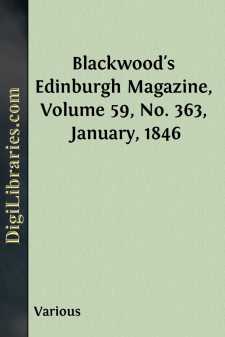Categories
- Antiques & Collectibles 13
- Architecture 36
- Art 48
- Bibles 22
- Biography & Autobiography 813
- Body, Mind & Spirit 142
- Business & Economics 28
- Children's Books 15
- Children's Fiction 12
- Computers 4
- Cooking 94
- Crafts & Hobbies 4
- Drama 346
- Education 46
- Family & Relationships 57
- Fiction 11828
- Games 19
- Gardening 17
- Health & Fitness 34
- History 1377
- House & Home 1
- Humor 147
- Juvenile Fiction 1873
- Juvenile Nonfiction 202
- Language Arts & Disciplines 88
- Law 16
- Literary Collections 686
- Literary Criticism 179
- Mathematics 13
- Medical 41
- Music 40
- Nature 179
- Non-Classifiable 1768
- Performing Arts 7
- Periodicals 1453
- Philosophy 64
- Photography 2
- Poetry 896
- Political Science 203
- Psychology 42
- Reference 154
- Religion 513
- Science 126
- Self-Help 84
- Social Science 81
- Sports & Recreation 34
- Study Aids 3
- Technology & Engineering 59
- Transportation 23
- Travel 463
- True Crime 29
Blackwood's Edinburgh Magazine, Volume 59, No. 363, January, 1846
by: Various
Description:
Excerpt
SIR WILLIAM FOLLETT.
The disappearance from the legal hemisphere of so bright a star as the late Sir William Follett, cast a gloom, not yet dissipated, over the legal profession, and all classes of society capable of appreciating great intellectual eminence. He died in his forty-seventh year; filling the great office of her Majesty's Attorney-general; the head and pride of the British Bar; a bright ornament of the senate; in the prime of manhood, and the plenitude of his extraordinary intellectual vigour; in the full noontide of success, just as he had reached the dazzling pinnacle of professional and official distinction. The tones of his low mellow voice were echoing sadly in the ears, his dignified and graceful figure and gesture were present to the eyes, of the bench and bar—when, at the commencement of last Michaelmas term, they re-assembled, with recruited energies, in the ancient inns of court, for the purpose of resuming their laborious and responsible professional exertions in Westminster Hall. It was impossible not to think, at such a time, of Sir William Follett, without being conscious of having sustained a grievous, if not an irreparable, loss. Where was he whose name was so lately a tower of strength to suitors; whose consummate logical skill—whose wonderful resources—taxed to the uttermost those of judicial intellect, and baffled and overthrew the strongest who could be opposed to him in forensic warfare? Where, alas, was Sir William Follett? His eloquent lips were stilled in death, his remains were mouldering in the tomb—yes, almost within the very walls of that sacred structure, hallowed with the recollections and associations of centuries, in which his surviving brethren were assembled for worship on Sunday the 2d day of November 1845—the commencement of the present legal year—at that period of it when his was erewhile ever the most conspicuous and shining figure, his exertions were the most interesting, the most important, his success was at once the most easy, decisive, and dazzling. Yes, there were assembled his brethren, who, with saddened faces and beating hearts, had attended his solemn obsequies in that very temple where was "committed his body to the ground, earth to earth, ashes to ashes, dust to dust," where all, including the greatest and noblest in the land, acknowledged, humbly and mournfully, at the mouth of his grave, that man walketh in a vain shadow, and disquieteth himself in vain; he heapeth up riches, and cannot tell who shall gather them! Surely these are solemnizing and instructive reflections; and many a heart will acknowledge them to be such, amidst all the din, and glare, and bustle of worldly affairs, in the awful presence of Him who turneth man to destruction, and sayeth, Come again, ye children of men!
Sir William Follett has now lain in his grave for six months. During this interval, the excitement which his death created amongst those who had been in constant intercourse with him for years, has subsided; leaving them better able to take a calm and candid view of his character, acquirements, and position, and form a sober estimate of the nature and extent of his reputation while living, and the probability of its permanently surviving him....












